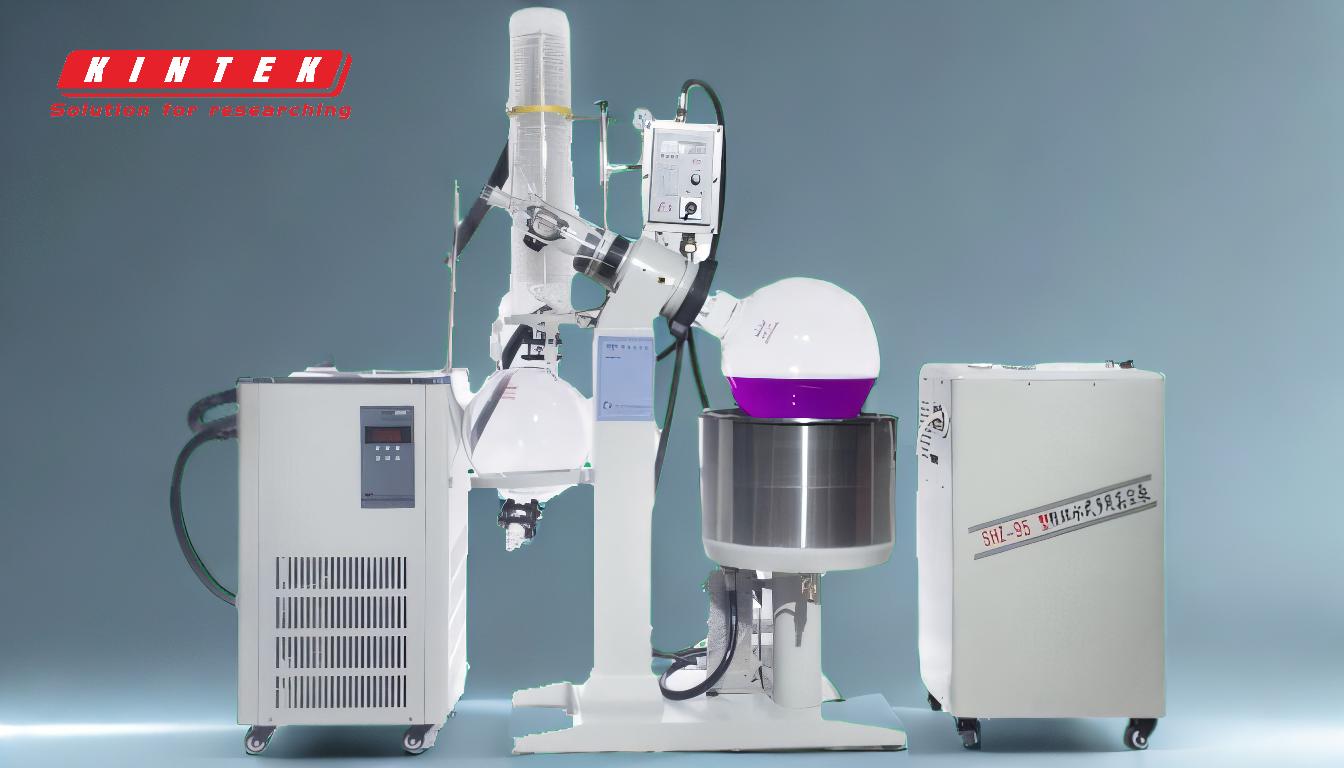A rotary evaporator, often referred to as a Rotavap, is a critical piece of laboratory equipment designed to separate solvents from reaction mixtures efficiently. Its significance lies in its ability to remove solvents with high boiling points under reduced pressure, which prevents unwanted side reactions such as oxidation or decomposition that could occur at higher temperatures. This makes it an essential tool in various scientific fields, including pharmaceuticals, biotechnology, and chemical research. The rotary evaporator is versatile, enabling processes like evaporation, concentration, crystallization, drying, separation, and solvent recovery. Its precise engineering, including vacuum and pressure control, ensures efficient and gentle solvent removal, making it indispensable for modern scientific advancements and discoveries.
Key Points Explained:

-
Efficient Solvent Removal:
- The rotary evaporator is specifically designed to remove solvents from reaction mixtures efficiently. This is particularly important for solvents with high boiling points, which would otherwise require high temperatures to evaporate at atmospheric pressure.
- By operating under reduced pressure, the rotary evaporator lowers the boiling point of solvents, allowing them to evaporate at lower temperatures. This minimizes the risk of thermal degradation or unwanted chemical reactions, such as oxidation or decomposition, which could compromise the integrity of the sample.
-
Prevention of Side Reactions:
- High temperatures can trigger undesirable side reactions in sensitive compounds. The rotary evaporator's ability to operate at lower temperatures under vacuum conditions ensures that the sample remains stable during the evaporation process.
- This feature is particularly crucial in the pharmaceutical and biotechnology industries, where preserving the integrity of compounds is essential for accurate research and development.
-
Versatility in Applications:
- The rotary evaporator is a versatile tool used for a wide range of laboratory processes, including evaporation, concentration, crystallization, drying, separation, and solvent recovery. This makes it a staple in both research and industrial settings.
- Its application spans multiple fields, including biological, pharmaceutical, chemical, and food-making industries. It is especially valuable in small-scale experiments and pilot production, where precision and efficiency are paramount.
-
Continuous Distillation of Volatile Solvents:
- One of the key advantages of a rotary evaporator is its ability to perform continuous distillation of large amounts of volatile solvents under reduced pressure. This capability is essential for processes that require the removal of solvents on a larger scale.
- The continuous operation ensures that the process is efficient and time-saving, making it ideal for industries that handle large volumes of solvents.
-
Importance in Research and Development:
- Rotary evaporators are indispensable in research and development, particularly in the isolation and purification of compounds. They are widely used in organic laboratories to concentrate samples by evaporating solvents under controlled conditions.
- Their role in isolating desired compounds after processes like column chromatography and separatory-funnel extractions highlights their importance in modern scientific workflows.
-
Engineering and Precision:
- The rotary evaporator's design incorporates precise engineering, including vacuum and pressure control mechanisms, to optimize evaporation efficiency. This ensures that solvents are removed gently and effectively without damaging the sample.
- The ability to control pressure and temperature with precision makes it a reliable tool for handling sensitive materials, further underscoring its significance in scientific research.
-
Industrial and Scientific Impact:
- The widespread use of rotary evaporators in industries such as pharmaceuticals, chemicals, and biotechnology underscores their importance in driving scientific advancements and discoveries.
- Their ability to handle large volumes of solvents and their versatility in various applications make them invaluable tools for both small-scale experiments and large-scale industrial processes.
In summary, the rotary evaporator is a cornerstone of modern laboratory equipment, offering a reliable and efficient method for solvent removal and sample concentration. Its ability to operate under reduced pressure, prevent side reactions, and handle a wide range of applications makes it an essential tool in scientific research and industrial processes. Its precision engineering and versatility ensure that it remains a critical asset in advancing scientific knowledge and technological innovation.
Summary Table:
| Feature | Description |
|---|---|
| Efficient Solvent Removal | Removes solvents with high boiling points under reduced pressure, minimizing thermal degradation. |
| Prevents Side Reactions | Operates at lower temperatures to avoid oxidation or decomposition of sensitive compounds. |
| Versatility | Used for evaporation, concentration, crystallization, drying, separation, and solvent recovery. |
| Continuous Distillation | Handles large volumes of volatile solvents efficiently under reduced pressure. |
| Research & Development | Essential for isolating and purifying compounds in organic and pharmaceutical labs. |
| Precision Engineering | Features vacuum and pressure control for gentle and effective solvent removal. |
| Industrial Impact | Widely used in pharmaceuticals, biotechnology, and chemical industries for large-scale processes. |
Enhance your lab's efficiency with a rotary evaporator—contact us today to learn more!



















